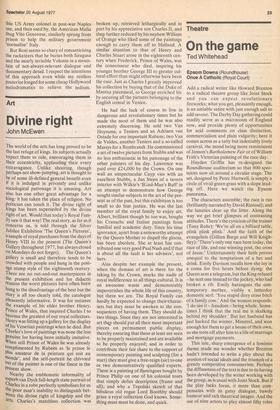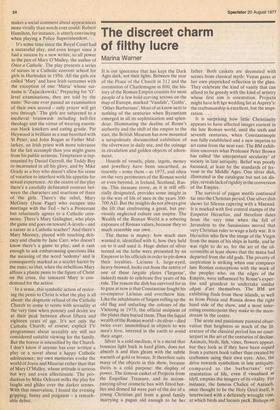Theatre
On the game
Ted Whitehead
Epsom Downs (Roundhouse) Once A Catholic (Royal Court)
Add a radical writer like Howard Brenton to a radical theatre group like Joint Stock and you can expect revolutionary fireworks; what you get, pleasantly enough, is an amiable satire with just enough salt to add savour. The Derby Day gathering could readily serve as a microcosm of England now, and provide plenty of opportunities for acid comments on class distinction, commercialism and plain vulgarity; here it comes across as a tatty but indeniably lively carnival, the mood being more reminiscent of Jonson's Bartholomew Fair or of William Frith's Victorian painting of the race day.
Hayden Griffin has re-designed the Roundhouse auditorium so that 800 spectators now sit around a circular stage. The set, designed by Peter Hartwell, is simply a circle of vivid green grass with a slope leading off. Here we watch the Epsom panorama.
The characters assemble; the race is run (brilliantly narrated by David Rintoul); and the lunatics clear up the litter, Along the way we get brief glimpses of contrasting attitudes. There's the cynicism of the trainer (Tony Rohr): 'We're all on a billiard table, plink plink plink.' And the faith of the evangelists (Gillian Barge and Will Knightley): 'There's only one race here today, the. race of life, and one winning post, the cross of Jesus.' Unfortunately their faith proves unequal to the temptations of a bet and drink. Emily Davison recalls how she lay in a coma for five hours before dying: the Queen sent a telegram, but the King refused — he sent one instead to the jockey, who had broken a rib. Emily harangues the contemporary mother, visibly a latterday domestic serf: You stupid dozy crass bitch of a family cow.' And the woman responds: 'I do see it — freedom — being whole. Sometimes I think that the real me is skulking behind my shoulder.' But her husband has just backed the winner, Minstrel, and won enough for them to get a house of their own, so she trots off after him to a life of marriage and mortgage payments.
This late, sharp emergence of a feminist theme made me wonder whether Brenton hadn't intended to write a play about the erosion of social ideals and the triumph of a greedy competitive consumerism. Perhaps the diffuseness of the text is due to its having been developed by the writer working with the group, as is usual with Joint Stock. But if the play lacks focus, it more than compensates with its gutsy dialogue, bawdy humour and rich theatrical images. And the use of nine actors to play almost fifty roles makes a social comment about appearances more vividly than words ever could: Robert Hamilton, for instance, is utterly convincing when playing a Police Superintendent.
It's some time since the Royal Court had a successful play, and even longer since it had a success by a new writer, so all power to the pen of Mary O'Malley, the author of Once a Catholic. The play presents a series of scenes in a Catholic convent school for girls in Harlesden in 1956. All the girls are called 'Mary' and have Irish surnames with the exception of one 'Maria' whose surname is `Zajaczkowski." Preparing for `0% level examinations, they are told by the nuns: 'No-one ever passed an examination of their own accord — only prayer will get you through.' The girls are subjected to a medieval brainwash including hell-fire theology and the virtue of wearing enormous black knickers and eating gristle. Pat Heywood is brilliant as a nun besotted with St Peter, and John Rogan as Father Mullarkey, an Irish priest with more tolerance for the fait accompli than you might guess from his public sermons. Temptation is represented by Daniel Gerroll, the Teddy Boy re-incarnated in all his glory, and by Mike' Grady as a boy who doesn't allow his sense of vocation to interfere with his appetite for sexual experience. At the centre of the play there's a carefully delineated contrast between the characters and reactions of three of 'the girls. There's the rebel, Mary McGinty (June Page) who escapes into marriage with the Ted — he's a Protestant but reluctantly agrees to a Catholic ceremony. There's Mary Gallagher, who plays the game and goes on toward A-levels — and a career as a Catholic teacher? And there's Mary Mooney, played with touching delicacy and charm by Jane Carr, who doesn't know there's a game to play, and is rash enough to ask embarrassing questions like the meaning of the word 'sodomy' and is consequently marked as a scarlet harlot by the nuns; so that, when the rebellious Mary affixes a plastic penis to the figure of Christ on the cross, the innocent Mary is condemned for the action.
In a sense, this symbolic action of restoring the penis to Christ is what the play is all about: the dogmatic refusal of the Catholic Church to come to terms with sexuality at the very time when potency and desire are at their peak between about fifteen and eighteen years of age. It's not only the Catholic Church, of course; explicit TV, programmes about sexuality are still not considered suitable viewing for the family. But the horror is intensified by the Church. I don't know if anyone has ever written a play or a novel about a happy Catholic adolescence; my own memories evoke the world of Joyce and Mauriac rather than that of Mary O'Malley, whose attitude is serious but wry and even affectionate. The production by Mike Ockrent milks the play for laughs and glides over the darker scenes. With that reservation, I found the evening gripping, funny and poignant — a remarkable debut.
































 Previous page
Previous page